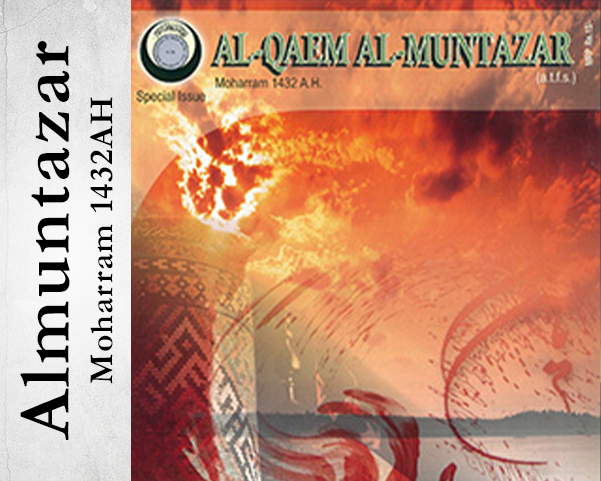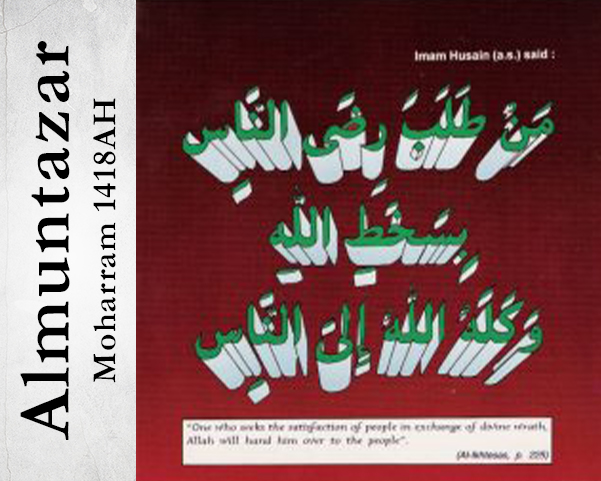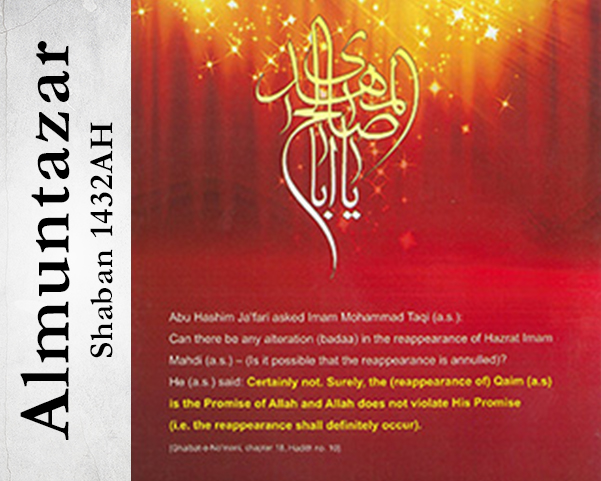Prior to the discussion on the uprising of the chief of martyrs, Imam Husain (a.s.) and Enjoining Good (AmrBilMaroof), let us reflect on the objective and aim of the uprising of Imam Husain (a.s.) for the sake of the survival and continuation of religion.What was the rationale behind Allah’s sending of Prophets and Messengers (a.s.)? Imam Husain (a.s.) is the inheritor of the Prophets (a.s.). His approach and the aim of his uprising can never differ from the approach and uprisings of Prophets (a.s.). We shall analyse all this keeping in mind the limitations of the size of the article. The Holy Quran has described the aims of sending Prophets in the following way
1. The Call towards Monotheism (Tauheed)
The aim of raising Prophets (a.s.) has been mentioned in numerous Verses of the Holy Quran such as “And certainly We raised in every nation an apostle saying: Serve Allah and shun the Shaitan”. (Surah Nahl, Verse 36)The same message has been reiterated by Hazrat Nuh (a.s.) (Surah A’raaf, Verse 59), Hazrat Hud (a.s.) (Surah A’raaf, Verse 65), Hazrat Saleh (a.s.) (Surah A’raaf, Verse 73) and Hazrat Shoaib (a.s.) (Surah A’raaf, Verse 85).Similarly, these same Prophets (a.s.) have echoed an identical message in Surah Hud, when each one said i.e. “O my people! Worship only Allah, you have no god other than He.”
(Surah Hud, Verses 50, 61 and 84)
In this way, the basis of sending Prophets (a.s.) and their message becomes evident – calling towards confession of Divine Unity (Tauheed) and refuting the power of all other Shaitans. Man is only a servant of his Allah. His entire life is under Allah’s control. Powerful kingdoms are insignificant for him before the Majesty of Allah.He does not submit to anyone other than Allah. He only focuses on Allah’s satisfaction and is not concerned with anyone else’s likes and dislikes. He seeks the pleasure of the creatures only if Allah’s pleasure is involved in it. Monotheism is not just an expression of acceptance (of divine unity). Rather, it is submission to Allah – the One, from the bottom of the heart. Surrendering all our affairs in the hands of Allah and regarding Allah as Omnipresent and Omniscient in all our actions, views and thoughts is the real meaning of Tauheed. A servant is always aware that Allah is watching him. “Does he not know that Allah is watching?”
(Surah Alaq : Verse 14)
It is on this basis that an obedient servant of Allah keeps away from sins. On the other hand, the one who considers himself as free and his own boss turns rebellious and does not regard Allah as Omnipresent and Omniscient, commits sins and transgressions.
2. Removal of Differences
The Holy Quran has explained the second aim of raising Prophets (a.s.) in the following manner –
“(All) people are a single nation; so Allah raised Prophets as bearers of good news and as warners, and He revealed the Book with truth, that he might judge between people in that which they differed.”
(Surah Baqarah : Verse 213)
“And We have not revealed to you the Book except that you may make clear to them that about which they differ, and (as) a guidance and a mercy for people who believe.”
(Surah Nahl : Verse 64)
According to these Verses, one of the aims of Prophets (a.s.) was to unite the people and remove their differences. Another fact which is highlighted through this is the extent to which Allah loves unity among people, hates differences and misunderstandings. Unfortunately, we have made creating rifts and differences as the aim of our life.
Prophets (a.s.) used to solve and eradicate all forms of differences – of opinions and views; land and property; mutual dealings of business partners; beliefs and actions, etc. In short, whatever differences that can crop up among the people can be resolved by Prophets (a.s.).
3. Establishment of Justice
One of the aims of raising Prophets (a.s.) is the establishment of justice and equity. Allah, the Almighty says, “Certainly We sent Our apostles with clear arguments, and sent down with them the Book and the balance that men may conduct themselves with equity.”
(Surah Hadeed, Verse 25)
Today, the downfall and destruction of the world is solely because of the injustices prevalent all around. There are some who possess so much wealth that it cannot be estimatedwhile there are others who are so poor that they cannot afford even a morsel of food. Power and authority are also on the same lines. Some people and countries wish that they should be able to control entire humanity and everyone should be subservient to them. They believe that the poor and the weak should not be in charge of their destinies; rather they believe that it is they who will govern the faith of the powerful nations. The Prophets (a.s.) raised the standard of justice and equity against these very satanic and rebellious superpowers. Hazrat Moosa (a.s.) raised the flag of justice and equity against the superpower of his time viz. Firaoun. He (a.s.) advised him that if he eschews the path of disbelief, polytheism, oppression, tyranny, injustice and inequity and follows the path of monotheism, faith, justice, equity and equality, then he (a.s.) would not be concerned with his kingdom and rule. The plea of H. Moosa (a.s.) to Firaoun was that he should forsake oppression and tyranny so that justice is established in the world and all the people could live in peace and harmony.
Justice and equity is not just a part of one’s social life but an integral aspect of an individual’s life because justice means to keep a thing at its appropriate place, the opposite of which is injustice which means to keep a thing at a place where it does not belong. Therefore, from the aspect of creed, monotheism is justice, polytheism is injustice; belief is justice, disbelief is injustice. From the aspect of actions, Allah’s obedience is justice while his disobedience is injustice. Joining relations with relatives is justice whereas severing relations with them is injustice. Obeying parents is justice while being negligent about them is injustice.
Prophets (a.s.) wanted to establish justice and equity in every aspect of man’s life and Allah had raised them for this very establishment of justice.
4. The religion of Islam is a universal and everlasting religion
Allah is not only for a particular region, group or era. Rather He is the Lord of the entire earth and heavens. The entire universe along with all its creatures is His creation and is in dependent on His bestowals at every instant. Allah is the Supreme Lord of one and all. He has provided the means of guidance for everyone. He mentions in the Noble Quran “Surely upon Us is the guidance”(Surah Lail, Verse 12); at another place He says “The month of Ramadan is that in which the Quran was revealed, a guidance to men…”
(Surah Baqarah, Verse 185)
It has been narrated concerning Holy Prophet (s.a.w.a.) “And We have sent you to all men as a bearer of good news and as a warner, but most men do not know.”
(Surah Saba, Verse 28)
In this way, Allah has sent the Holy Quran as a source of guidance for the entire world and the Holy Prophet (s.a.w.a.) as a guide, a bearer of good news and a warner. Hence, it becomes clear that the Holy religion of Islam is not specific to any particular place, section or group. Rather it is a universal and eternal religion. “Surely the religion near Allah is only Islam.”
When Allah, the Almighty, has considered the religion of Islam to be universal and has also said “And whoever desires a religion other than Islam, it shall not be accepted from him, and in the hereafter he shall be one of the losers.” (Surah Aale Imran, Verse 85), then He – the Most High – in order to complete His argument, sent such people who would protect the Divine Message and spread it to each and every one in every corner of the world so that none can claim that the Islamic teachings did not reach us and hence we went astray.
On the other hand, Shaitan and his group are severe enemies of Islam. He desires deviation instead of guidance. He wishes for corruption instead of harmony, polytheism instead of monotheism, hypocrisy instead of faith. He has vowed to misguide each and every one. He does not want anyone to enter Paradise and has vowed to misguide everyone. “He said: Then by Thy Might, I will surely make them live an evil life, all” (Surah Suaad, Verse 82)But has also confessed his inability and helplessness when he said “Except Thy purified servants from among them.” (Surah Suaad, Verse 83) In this way Shaitan – right in the beginning -has admitted to his failure in front of the pious servants of Allah, who will never be misled by him. Besides Shaitan, the inner self of man too orders him to do evil, “Most surely (man’s) self is wont to command (him to do) evil.”
(Surah Yusuf, Verse 53)
5. Islam guarantees bliss for mankind
Allah, the Almighty, revealed the religion of Islam for the guidance and good fortune of every human being. He sent Prophets and Messengers for the guidance and good fortune of people. On the other hand, Shaitan and his group are enemies of human guidance and good fortune. The danger of going astray lurks around every step. Hence, there is a need for a group which invites people towards guidance and bliss and prevents from deviation and misfortune. Just as there are red and white blood cells in the human body –one which absorbs nutrients which are beneficial for the body and the other which prevents harmful elements from entering into the body and till the time this balance is maintained, man remains healthy but when this balance is disturbed, his health is affected. Similarly, for the reformation of the human society and its good fortune and success, there is a need for such people who keep advising each and every person of the society towards goodness (Maroof) and prevent them from evil things (Munkar). The holy religion of Islam has interpreted these elements of life as ‘Enjoining Good’ (Amrbil Ma’roof) and ‘Forbidding Evil’ (Nahyanil Munkar). It is mentioned in the Noble Quran “You are the best of the nations raised up for (the benefit of) men; you enjoin what is right and forbid the wrong and believe in Allah.”
(Surah Aale Imran, Verse 110)
It is evident from the above Verses that the Muslims are the best of the nations till the time they continue to fulfil the obligation of enjoining good and forbidding evil and their success is only guaranteed when they fulfil this divine responsibility. Just as the fulfilment of enjoining good and forbidding evil assures them of success and prosperity, at the same time negligence and carelessness towards this great obligation will humiliate and disgrace them.
Imam Muhammad Baqir (a.s.) says, “Enjoining good and forbidding evil is a great responsibility based on which all other obligatory acts exist. Due to them, there is peace and harmony in the area, business is carried out lawfully, injustice comes to a halt, the earth prospers and revenge is sought from the enemies. Based on this, all other affairs follow their correct path.”
(Wasaael al-Shiah, Chapter of Amr bil Ma’roof, H. 395)
Therefore, enjoining good and forbidding evil are the mainstays and backbone of human society by which the entire system is in order. If there is a lacuna and hindrance in fulfilling this responsibility, the entire Islamic system will be in a state of disorder.
Ameerul Momineen Ali Ibn Abi Talib (a.s.) says, “It is due to enjoining good and forbidding evil that Shariat stands firm and Allah’s laws are enforced.”
(Ghurar al-Hikam, H. 6817 & Mizanul Hikmah, v. 8, H. 3698)
The importance of enjoining good and forbidding evil becomes more evident through this tradition where Ali Ibn AbiTalib (a.s.) says, “All good acts – including struggling in the way of Allah (Jihad) – in comparison to enjoining good and forbidding evil are like a cup of water vis-a-vis the ocean.”
(Nahj al-Balaagha, Saying 374)
6. The responsibility of the Awliya (friends) of Allah
The importance of enjoining good can be understood from the aforementioned traditions. On one hand, where Allah, the Almighty, has granted an eminent status to His friends, on the other hand their responsibilities are also different. In the battle of Hunayn, a person said to Imam Ali Ibn Abi Talib (a.s.), “You go back to Iraq and we shall return to Syria.”
He (a.s.) replied, “I know that you say this out of (our) love. Allah, Blessed and High be He, does not agree to the fact that He is disobeyed on the earth and people continue to commit sins while His friends remain just passive onlookers and do not perform enjoining of good and forbidding of evil. Hence, fighting is better for me than being shackled in the chains of hell.”
(Mizanul Hikmah, H. 12691)
This incident makes it clear that being heedless of the world and only being engrossed in our personal life is not liked by Allah. Just as Allah the Almighty has elevated the status of His friends, He has also entrusted them the responsibility of not remaining passive onlookers with respect to the violations of the Divine Laws but preventing all kinds of wrongdoings even if they have to fight against it.
Imam Husain (a.s.) explained this in the following manner,
“It is not appropriate for any believer that he turns his eyes away from the disobediences of Allah and does not change the circumstances.”
(Tanbeeh al-Khaatir, v. 2, p. 179; Mizanul Hikmah, H. 12700)
Allah has made the believers responsible regarding the wrongdoings occurring around them. He has exhorted them not to be silent spectators to the evils being perpetuated in the society. Rather, it is the responsibility every believer that he should try and change the circumstances.
Imam Ja’far Sadiq (a.s.) said, “If a person witnesses a wrongdoing and does not prevent it – if possible for him – then it is as if he likes that Allah, the Almighty, should be disobeyed. One who likes that Allah is disobeyed has become Allah’s enemy.”
(Tafseer-e-Ayyashi, v. 1, p. 360; Mizanul Hikmah, H. 12701)
According to Islamic teachings, it is a honour for a believer that neither he commit sins nor does he allow sins to be committed. Approving of sins is tantamount to becoming Allah’s enemy. If such is the honour of a believer then the status of Allah’s special friends and the proximate ones is unimaginable.
Imam Muhammad Baqir (a.s.) says, “Most certainly enjoining good and forbidding evil is a way of the Prophets and an approach of the righteous.”
(Al-Kaafi, v. 5, p. 56)
6. Imam Husain (a.s.) – The Inheritor of Prophets
Imam Husain (a.s.) has been offered salutations in Ziyaarat-e-Waarisah by addressing him as the inheritor of H. Adam (a.s.), H. Nuh (a.s.), H. Ibrahim (a.s.), H. Moosa (a.s.), H. Isa (a.s.), H. Muhammad Mustafa (s.a.w.a.) and H. Ameerul Momineen (a.s.). Imam Husain (a.s.) is not only their inheritor through lineage but also the inheritor of their religion, their laws and their teachings. Thus, the responsibilities of Imam Husain (a.s.) include inviting people towards Allah’s Unity, removing of mutual differences and spreading of justice and equity in the world, especially in the human society.
He could neither tolerate to see the message of monotheism being destroyed nor bear to see the differences among people nor remain silent over injustice and tyranny. His pure and chaste nurturing in early childhood and pure blood running through his veins did not allow him to remain silent on the conditions created by Yazid and his family. He could not bear to witness the disobedience of Allah on His land. The obligation of enjoining good and forbidding evil was beckoning him to rise up and take a stand against Yazid so that the message of monotheism would remain safe and unscathed forever and the light of the sun of justice and equity would never be extinguished. Imam Husain (a.s.) has explained the conditions of his time in the following words and along with it he has also explained the reason for his uprising. He wrote in a letter to the people of Basra,
“Now, Verily Allah has chosen Prophet Muhammad (s.a.w.a.) above all His creatures. He granted him prestige and honour through Prophethood and chose him for His Messengership and Message. Then Allah called him towards Himself (i.e. death) after he had guided the people and after having propagated whatever was revealed upon him. May Allah’s salutations be upon him. Thus, we are his Household (Ahle Bait), friends, vicegerents and his successors and are more worthy of succeeding him than anyone else. People have given others precedence over us. We were patient and avoided dissent. We cherish peace and tranquillity while we know that we are more worthy of this position (of Caliphate) and more deserving of regaining it than anyone else.
With this letter, I send towards you my messenger and I invite you to the Book of Allah and the tradition (sunnah) of Holy Prophet (s.a.w.a.) because the traditions (sunnah) of the Prophet (s.a.w.a.) have been destroyed and have been replaced by innovations.You pay heed to my words and obey my command and then I shall guide you towards the right path. And peace be upon you and Allah’s blessings and mercy.”
(Maqtal al-Husain by Muqarram, p. 159)
In this letter, Imam Husain (a.s.) while rightly establishing himself to be worthy of the position of guidance has also suggested that the Ahle Bait (a.s.) have always been patient over the usurping of their right of Caliphate. They (a.s.) maintained their dignity by remaining silent because they did not wish to create differences among the people and hamper peace and security by creating chaos and conflict. Then, he narrated the present scenario by saying that the sunnah (traditions) of the Prophet (s.a.w.a.) had been destroyed and innovations were created thereby implying that the Islamic teachings were being annihilated and the customs and traditions of ignorance were being practised once again.
On the way, he confronted Hurr’s army. Imam Husain (a.s.) addressed the latter’s soldiers in the following manner,
‘O people! The Messenger of Allah (s.a.w.a.) has said: “If a person sees an oppressive ruler who legitimises that which has been prohibited by Allah, opposes the sunnah (tradition) of the Prophet, behaves unjustly and oppressively against Allah’s servants while everyone around are just mute spectators, then it is incumbent upon Allah to place them in their appropriate place (i.e. cause them to enter Hell).
Certainly, these people have adhered to the obedience of Shaitan and have gone against the Most Merciful Allah. They have spread corruption, trampled upon the religious laws and are squandering the public treasury (BaitulMaal) as per their wishes. They have made the lawful as unlawful and vice versa.
(Kaamil, v.3, p. 280; Tabari, v. 4, p. 300; Qiyame Husaini by Qazvini, p. 91)
He (a.s.) then narrated the tradition of the Holy Prophet (s.a.w.a.) and said, “Opposing the tyrant and the oppressive rulers and those who alter the commands of Allah, agitating and rising against them is the sunnah (tradition) of the Prophet and the command of Allah.”
After this he recounted the circumstances of that time. The silence in Hurr’s army was a testimony to the words of Imam Husain (a.s.). All of them were agreeing to the fact that Islamic teachings were being destroyed and the religion of Allah was being damaged.
In the end, by saying that he was worthier over others, he meant that changing those conditions and rebelling against the oppressive and tyrant rules was his responsibility i.e. his revolt was not rooted in individual or personal enmity; rather it was his religious responsibility – Allah and His Prophet expected it.
The warning that he gave to the people of Basra was the beginning of his uprising; the conversation with Hurr’s battalion was during his journey and the eternal uprising of Karbala was the final frontier. Imam (a.s.) addressed the army of Yazid in the same manner in Karbala. Before beginning the war, Imam (a.s.) said,
“Now then, whatever is happening to us is in front of you. The world has changed, the situation has changed. Good deeds have come to an end, and even if they remain, then only in a quantity equal to a little water remaining in a vessel after it is has been emptied. Life has fallen to the low grades of rotten fodder.
Do you not see that neither religion is being followed nor people are refraining from falsehood?
At such a time a believer should be desirous to meet his Lord (i.e. die). Death near me is nothing but good fortune and victory and living with a tyrant is nothing but disgrace and shame.
(Maqtalul Husain by Mohsin Amin, p. 90)
Even here, Imam Husain (a.s.) has drawn everyone’s attention to the fact that good had turned into evil while evil had been clothed with the garment of goodness. Those who believe in Allah and the Prophet should not remain silent and should rise and stand up for righteousness.
7. The Responsibility of an Imam
In reply to the letters of the people of Kufa, Imam Husain (a.s.) sent Muslim Ibn Aqeel (a.s.) as his representative and confidant with a letter in which he highlighted the responsibilities of the Imam of the time appointed by Allah, in the following manner,
“By Allah, an Imam is the one who acts in accordance to the Book of Allah, establishes justice and equity, professes the religion of Allah and dedicates himself to Allah’s will.”
(Maqtalul Husain by Mohsin Amin, p.33; QiyameHusaini by Qazvini, p. 46)
Over here, Imam Husain (a.s.) has indicated towards the fact that the protection of Quranic orders, the sunnah of the Prophet and the Islamic teachings as well as the establishment of justice and equity is the responsibility of an Imam appointed by Allah (mansoos min Allah). It also emphasises the blunders of selecting a caliphate as according to one’s whims and fancies. The entire destruction of society and ruining of Islamic teachings are all a result of this incorrect choice.
8. Announcement of the Uprising
The importance of enjoining good and forbidding evil can be clearly understood by the fact that Imam Husain (a.s.) had outlined his aim and manner of revolt right at the onset. While mourning over Imam Husain (a.s.), we should remember this aim and enliven this aim while expressing our grief and not be negligent of it. Imam (a.s.) says,
“I have risen neither to spread evil nor to boast nor to spread immorality nor oppression. But I only want the betterment of the nation of my grandfather and I desire to enjoin good and forbid evil.”
Till here, he (a.s.) explained the aim of his uprising. He (a.s.) then continued to explain his approach in achieving his goal in the following manner,
“I wish to tread the path and character of my grandfather and my father Ali Ibn Abi Talib (a.s.). The one who rejects me in the matters of truth, I shall bear it patiently until Allah judges between myself and that nation with truth and He is the Best Judge.”
(Maqtal al-Husain by Khaarazmi, v. 1, p. 88)
Thus, the aim of the uprising was to enjoin good and forbid evil while the manner of revolt was to adopt the character of Holy Prophet (s.a.w.a.) and of Ali Murtuza (a.s.). Hence, Imam Husain (a.s.) has unequivocally announced that his approach shall be completely different from other Caliphs. He shall tread the path of his predecessors and nobody else. If he had to accept the behaviour of the tyrants, then there would be no need for this uprising.
9. The Last Decision and the Uprising
Imam Husain (a.s.) tried to make people understand and explain the truth in every possible way. If you are Muslims and believe in Allah, the Prophet and Qiyamat, then how can you tolerate innovations in religion? Are you not seeing the sunnah of the Prophet being wiped out? Are there not innovations being made and the customs and traditions of the time of paganism (jaahiliyyah) being enlivened in front of you? You are neither committed to your word nor fulfil your promise. By surrounding me from all sides with the army of oppression and tyranny, you desire that I either change my path or remain silent and continue to watch the religion being destroyed. Then beware,
“The illegitimate son of the illegitimate father (Ibn Ziyad) has stationed me between two things – death and humiliation. By no means shall we accept humiliation.”
Imam Husain (a.s.) has clearly stated that remaining silent in the face of falsehood is humiliation. Excellence is not just to remain alive; rather it is a life full of dignity. Imam Husain (a.s.) announced his firm decision to everyone in the following manner,
“Allah, His Prophet and the believers do not wish for us that we accept humiliation. The sacred laps which have nursed us and the modest and the venerable people disagree that we give preference to the obedience of ignoble men over a dignified death. I shall fight you even with these few supporters who are small in number.”
Imam Husain (a.s.) granted eternity to Islam and its teachings by embracing martyrdom with dignity.
















